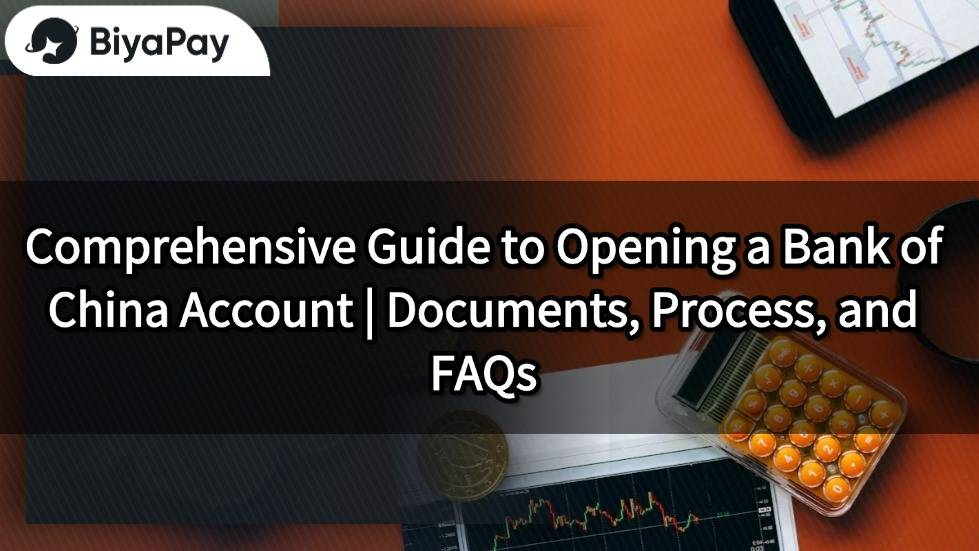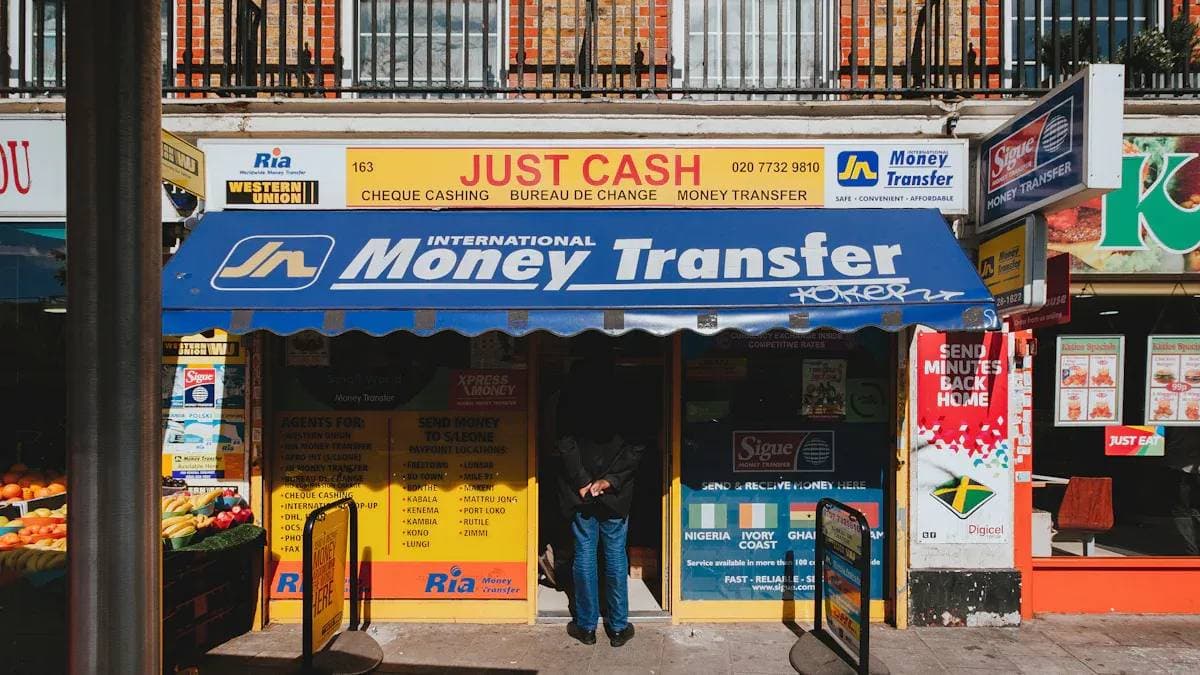- EasyCard
- Trade
- Help
- Announcement
- Academy
- SWIFT Code
- Iban Number
- Referral
- Customer Service
- Blog
- Creator
Comprehensive Guide to Opening a Bank of China Account | Documents, Process, and FAQs

Image Source: unsplash
If you want to apply to open a Bank of China account, you must prepare the following documents:
- Hong Kong Identity Card
- Mainland Travel Permit for Hong Kong and Macau Residents
- Valid proof of address issued within the last three months
- A real-name authenticated mainland mobile phone SIM card
You must be at least 18 years old to apply. When opening an account, the bank generally requires a deposit of approximately USD 40 to USD 400 (calculated at 1 USD = 7.8 HKD), with requirements varying by bank. In some cases, you may also need to provide proof of employment or a student ID. Please ensure all documents are originals and within their validity period, as these documents are essential, and without them, you cannot complete the Bank of China account opening process.
Key Points
- Prepare all original documents, including ID, proof of address, and a real-name authenticated phone number, ensuring they are valid and clear to avoid delays due to resubmission.
- You can choose to open an account in person at a branch, via a mobile app, or through remote witnessing, selecting the most convenient process based on your situation.
- Personal accounts, joint accounts, and commercial accounts have different document requirements; choose the appropriate account type to suit your financial and business needs.
- You need to deposit the minimum amount immediately upon opening an account and maintain the account balance to avoid management fees, regularly checking the account status to ensure fund security.
- After opening an account, you can link it to electronic payments and use online banking platforms to improve financial efficiency and enhance account security management.
Required Documents for Account Opening

Image Source: unsplash
Personal Account
If you want to apply to open a Bank of China account, you must prepare the following documents:
| Document Name | Purpose | Validity/Notes |
|---|---|---|
| Hong Kong Identity Card | Identity Verification | Must be original and not expired |
| Proof of Address | Address Verification | Valid within three months, e.g., utility bill, bank statement |
| Mobile Phone Number | Contact and Authentication | Must be real-name authenticated, preferably a mainland SIM card |
| Tax Resident Number | Tax Reporting | Fill in accurately if required |
| Proof of Employment/Student ID | Eligibility Review | Required in some cases, prepare in advance |
Tip: All documents you submit must be originals. Proof of address must clearly show your name and address. The bank may sometimes require you to resubmit documents, such as unclear or expired proof of address. You should check the document contents in advance to reduce the need for resubmission.
Joint Account
If you want to apply for a joint account with family or friends, all joint account holders must provide the following documents:
- Each person’s Hong Kong Identity Card
- Each person’s valid proof of address issued within the last three months
- Each person’s mobile phone number
- Each person’s tax resident number (if applicable)
- Proof of employment or student ID (if required by the bank)
You must ensure all joint account holders are present in person and bring all original documents. The bank will verify everyone’s information simultaneously. If any documents are incomplete, the bank will require you to resubmit, which will delay the Bank of China account opening process.
Commercial Account
If you want to open a commercial account for your company, the required documents will be more extensive than for a personal account:
| Document Name | Purpose | Validity/Notes |
|---|---|---|
| Certificate of Incorporation | Company Identity Verification | Must be original and not expired |
| Business Registration Certificate | Proof of Company Operations | Must be original and not expired |
| Directors and Shareholders’ Identity Proof | Verification of Directors/Shareholders | Required for all major directors and shareholders |
| Articles of Association | Company Operating Rules | Latest version, original |
| Proof of Address (Company and Directors) | Address Verification | Valid within three months, original |
| Tax Resident Number | Tax Reporting | For company and major directors, fill in accurately if required |
| Proof of Business Operations | Review of Business Authenticity | E.g., contracts, invoices, bank statements |
Note: All company documents you submit must be originals. The bank may require you to resubmit additional documents, such as the latest business contracts or financial statements. You should check the required document list with bank staff in advance to avoid repeated resubmissions, improving the efficiency of the Bank of China account opening process.
Bank of China Account Opening Process

Image Source: unsplash
In-Person Account Opening
If you choose to open an account in person at a Bank of China branch, you can communicate directly with bank staff. This method is suitable for first-time account opening or if you need immediate answers to questions. You can follow these steps:
- Book a Branch Appointment
You can call the Bank of China customer service hotline or book a branch appointment on the official website. Some branches accept walk-ins, but booking can reduce waiting time. - Prepare Documents
You need to bring all original documents, including ID, proof of address, mobile number, and tax resident number. If you are a non-local resident, you also need to bring your passport and entry proof. - Visit the Branch for Processing
Upon arriving at the branch, bank staff will verify your documents. You need to fill out an account opening application form and answer simple background questions, such as occupation and account purpose. - Deposit the Opening Amount
The bank will require you to deposit the opening amount on the spot. Generally, this is USD 40 to USD 400, with the actual amount depending on the account type and branch requirements. - Receive Bank Card and Activate Account
After completing the application, the bank will notify you to collect your bank card immediately or later. You need to follow instructions to activate the account and set up online banking.
Tip: If you are a mainland resident, you need to provide a Mainland Travel Permit and a mainland real-name authenticated SIM card. If you are a non-local resident, you need to prepare additional identity and entry documents. You should check branch requirements in advance to avoid delays due to resubmission.
Mobile App Account Opening
If you want to save time, you can choose to open an account using the Bank of China mobile app. This method is suitable for those who already hold a Hong Kong ID and proof of address. You can follow this process:
- Download and Install the App
You can download the official “Bank of China (Hong Kong)” app from the App Store or Google Play. - Online Appointment and Data Entry
After opening the app, select “Open New Account.” You need to enter personal information and upload photos of your ID, proof of address, and other documents. - Facial Recognition and Phone Verification
The app will require you to perform facial recognition to verify your identity. You also need to receive a verification code using a real-name authenticated phone number. - Review and Approval
The bank will review your application within 1 to 3 working days. If your documents are complete, the review process will be faster. - Receive Bank Card and Activate Account
You can choose to collect your bank card at a branch or have it mailed to a designated address. After receiving the card, follow the app’s instructions to activate the account.
Note: If you are a mainland or non-local resident, some features or account types may not be supported for app-based account opening. You should review the official guidelines first to ensure eligibility.
Witnessed and Remote Account Opening
If you are overseas or unable to visit a branch in person, you can consider witnessed or remote account opening. This method is suitable for those frequently traveling between China and Hong Kong or unable to visit in person due to special circumstances.
- Witnessed Account Opening
You can visit a designated Bank of China witnessing branch (e.g., in mainland China or overseas) where local staff will verify your identity and documents. The bank will forward your information to the Hong Kong branch for approval. - Remote Account Opening
You can submit an application through the Bank of China online platform. You need to upload all documents and undergo video witnessing. The bank will arrange a video call with a dedicated staff member to verify your identity and document authenticity.
| Account Opening Method | Suitable For | Main Steps | Notes |
|---|---|---|---|
| Witnessed Account Opening | Overseas or Mainland Residents | Visit witnessing branch, document verification, forward for approval | Requires appointment, longer approval time |
| Remote Account Opening | Those unable to visit in person | Online application, document upload, video witnessing | Requires stable internet, high-resolution document photos |
Tip: When choosing witnessed or remote account opening, you should allow more time for approval. If documents are incomplete, the bank will require resubmission, extending the entire Bank of China account opening process.
Account Type Selection
Personal vs. Joint
You can choose to open a personal account or a joint account based on your needs. A personal account is suitable for managing funds independently, with a simple operation and faster account opening process. A joint account is suitable for managing funds with family or partners. All joint account holders can operate the account, but withdrawals or transfers may require the consent of all holders. You should note that all joint account holders must be present in person and bring the required documents.
Tip: If you want convenient financial management and division of responsibilities, a joint account is more suitable for families or small collaborative projects.
HKD, RMB, Multi-Currency
You can choose to open an HKD account, an RMB account, or a multi-currency account. An HKD account is suitable for daily consumption and transactions in Hong Kong. An RMB account is suitable for those with business in China or frequent travel to China. A multi-currency account allows you to manage multiple currencies, including USD, HKD, and RMB, facilitating international transactions or currency exchanges.
| Account Type | Suitable For | Main Uses |
|---|---|---|
| HKD Account | Hong Kong Local Users | Daily consumption, transactions |
| RMB Account | Those with China connections | Mainland transactions, savings |
| Multi-Currency Account | International business or wealth managers | Multi-currency management, exchanges |
If you frequently need different currencies, you can consider a multi-currency account to reduce exchange fees.
Commercial Account
If you run a company or are self-employed, you should choose a commercial account. Commercial accounts are designed for businesses, facilitating company collections, payments, and payroll. You can set multiple authorized personnel to manage the account, improving company fund operation efficiency. Commercial accounts typically require more documents, such as certificates of incorporation, business registration certificates, and proof of business operations. You should allow more time for preparation and approval.
Note: Commercial accounts generally have higher minimum deposits and management fees. You should carefully review the fee structure and choose the most suitable account plan.
Common Account Opening Questions
Reasons for Rejection
When applying for a bank account, you may face rejection. Common reasons include incomplete documents, expired proof of address, issues with identity proof, inconsistent information, or inability to verify your employment background. If you have a poor credit record, the bank may also reject your application. You should carefully check all information before submitting your application to ensure every document is authentic and valid.
Tip: If you have been rejected by other Hong Kong banks, you should understand the reasons first and prepare more complete documents before reapplying.
Minimum Deposit and Management Fees
When opening an account, the bank will require you to deposit a minimum amount. For personal accounts, the minimum deposit is typically around USD 40 to USD 400 (calculated at 1 USD = 7.8 HKD). Commercial accounts have higher minimum deposit requirements. If you fail to maintain the minimum balance, the bank will charge a monthly management fee, ranging from approximately USD 5 to USD 15. You should regularly check your account balance to avoid management fee deductions.
| Account Type | Minimum Deposit (USD) | Monthly Management Fee (USD) |
|---|---|---|
| Personal Account | 40-400 | 5-15 |
| Commercial Account | 200-1000 | 10-30 |
Document Resubmission
If the documents you submit are incomplete or contain errors, the bank will require you to resubmit. Common resubmission items include updated proof of address, additional tax resident numbers, or proof of employment. You should prepare original documents as soon as possible and submit them in person or through the online platform. If you delay resubmission, the bank will extend the approval time or even cancel the application.
Risk Control and Review
The bank will conduct risk management and review for all new account applications. You need to answer questions about the source of funds, account purpose, and employment background. If you are involved in high-risk industries or have unclear fund sources, the bank will intensify its review and may reject the application. You should truthfully declare all information and retain relevant supporting documents. The bank reserves the right to request additional information or explanations for transactions at any time.
Account Opening Notes
Improving Success Rate
If you want to improve your account opening success rate, you should focus on the details. The bank’s most common review focuses include identity proof, address proof, and contact information. You can refer to the following suggestions:
- Prepare all original documents, including ID, Mainland Travel Permit, border crossing receipt, valid proof of address within three months, and bank statements.
- When filling out information, ensure every item matches the documents, especially name, date of birth, and address.
- Use a valid contact phone number to facilitate bank communication regarding your application.
- When opening an account online, follow the app’s instructions step-by-step to ensure each step is completed correctly.
Tip: If you need to adjust transaction limits or have interview requirements, you should proactively inquire with the bank to avoid rejection due to non-compliance with rules.
Document Preparation
When preparing documents, you should pay attention to the following details:
- When uploading document photos, avoid reflections or blurriness. Reflections may cause upload failures, requiring re-photography and affecting efficiency.
- Proof of address must be detailed and accurate. The bank will send password letters and cards based on the provided address, and incorrect addresses will lead to delivery failures.
- All documents must be within their validity period, as expired documents will not be accepted by the bank.
- If required, prepare proof of employment or student ID in advance, as some banks may request resubmission.
| Document Type | Notes |
|---|---|
| Identity Proof | Must be original, clear, and not expired |
| Proof of Address | Within three months, shows name and address |
| Contact Information | Real-name phone, able to receive verification codes |
Common Mistakes
During the application process, you are likely to make the following mistakes:
- Uploading documents with reflections or unclear photos, causing the system to fail to recognize them.
- Incomplete or incorrect address information, affecting the bank’s document delivery.
- Ignoring the bank’s request for additional documents, delaying the approval process.
- Forgetting to bring all original documents, requiring multiple trips to the branch.
Tip: Before submitting information each time, you should double-check all documents and data to reduce errors and improve account opening efficiency.
Post-Account Opening Management
Linking Electronic Payments
After opening your account, you can link your bank account to various electronic payment tools. Common options include Alipay Hong Kong, WeChat Pay, Apple Pay, and Google Pay. You simply need to select “Add Bank Account” in the mobile app and enter your bank card details. Some electronic payment platforms may require a small verification transaction, such as deducting USD 1 (approximately 7.8 HKD), to confirm account authenticity. You should ensure your mobile number matches the bank’s registered information to smoothly receive verification codes. After successful linking, you can use electronic payments for purchases, transfers, or bill payments, improving daily financial efficiency.
Tip: If you frequently shop in China or Hong Kong, it’s recommended to link both RMB and HKD accounts for convenient exchanges and payments.
Online Banking
You can use online banking platforms to manage your account. Bank of China (Hong Kong) offers online banking and a mobile app, allowing you to check balances, transfer funds, pay bills, and invest anytime. When logging in for the first time, you need to set a login password and security questions. You should regularly update your password and avoid using birthdays or simple number combinations. The online banking platform supports multi-currency operations, allowing you to directly exchange USD, HKD, or RMB, with the system automatically calculating based on the daily exchange rate. If you have investment needs, you can purchase funds, bonds, or forex products through the platform.
| Function | Operation Method | Notes |
|---|---|---|
| Check Balance | Online Banking/App | Requires login password |
| Transfer/Pay Bills | Online Banking/App | Set payee, verify information |
| Currency Exchange | Online Banking/App | Automatically calculated based on daily exchange rate |
| Investment Management | Online Banking/App | Requires additional risk assessment |
Account Security
When managing your bank account, you must prioritize security. You should enable two-factor authentication, such as SMS verification codes or a dynamic password generator. You should not disclose your login password or verification codes to others. If you receive suspicious SMS or emails, do not click on unknown links. You should regularly check transaction records and contact the bank immediately if you notice anomalies. Bank of China (Hong Kong) periodically updates security measures to protect your funds. If you lose your bank card or suspect your account has been compromised, you should immediately call the customer service hotline to freeze the account.
Note: Each time you log into online banking, you should verify the website URL to avoid accessing fraudulent sites.
When opening a bank account, you should prepare all original documents and carefully check the information. You can choose in-person, mobile app, or remote account opening based on your identity and needs. You should regularly check your account status and make good use of online banking features. If you encounter issues, you should promptly contact the bank to ensure fund security.
FAQ
What proof of address documents can you use?
You can use utility bills, bank statements, or government letters issued within the last three months. The document must show your name and address. The bank generally accepts originals or electronic versions.
Can you open an account if you are under 18?
If you are under 18, you cannot open a personal account independently. You can apply for a joint account accompanied by a parent. Some Hong Kong banks offer special children’s or student accounts.
How long does it take to receive a bank card after opening an account?
You generally receive your bank card within 3 to 7 working days after completing the account opening. You can choose to collect it at a branch or have it mailed to your address. Processing times vary among Hong Kong banks.
Can you open multiple currency accounts simultaneously?
You can open HKD, RMB, and multi-currency accounts simultaneously. A multi-currency account facilitates managing different currencies. You need to prepare relevant documents based on bank requirements.
How much do you need to deposit immediately when opening an account?
You need to deposit approximately USD 40 to USD 400 when opening an account (calculated at 1 USD = 7.8 HKD). Requirements vary by account type and Hong Kong bank. You should inquire in advance.
Opening a Bank of China account establishes a foundation for fund management, but complex documentation or processes may delay setup, while high cross-border remittance fees, cumbersome currency exchanges, and limited flexible savings options independently constrain fund efficiency. BiyaPay, as an all-in-one financial platform, enables real-time US and HK stock trading without complex account setup, making global fund management simple. Platform remittance fees are as low as 0.5%, covering 190+ countries with same-day transfers. Its flexible savings product offers a 5.48% annualized return, with daily interest credited automatically and withdrawals anytime, supporting 30+ fiat and 200+ cryptocurrencies, secured by KYC.
Try BiyaPay now to start your global investment journey! Join BiyaPay for efficient fund management!
*This article is provided for general information purposes and does not constitute legal, tax or other professional advice from BiyaPay or its subsidiaries and its affiliates, and it is not intended as a substitute for obtaining advice from a financial advisor or any other professional.
We make no representations, warranties or warranties, express or implied, as to the accuracy, completeness or timeliness of the contents of this publication.




Contact Us
Company and Team
BiyaPay Products
Customer Services
is a broker-dealer registered with the U.S. Securities and Exchange Commission (SEC) (No.: 802-127417), member of the Financial Industry Regulatory Authority (FINRA) (CRD: 325027), member of the Securities Investor Protection Corporation (SIPC), and regulated by FINRA and SEC.
registered with the US Financial Crimes Enforcement Network (FinCEN), as a Money Services Business (MSB), registration number: 31000218637349, and regulated by FinCEN.
registered as Financial Service Provider (FSP number: FSP1007221) in New Zealand, and is a member of the Financial Dispute Resolution Scheme, a New Zealand independent dispute resolution service provider.




















